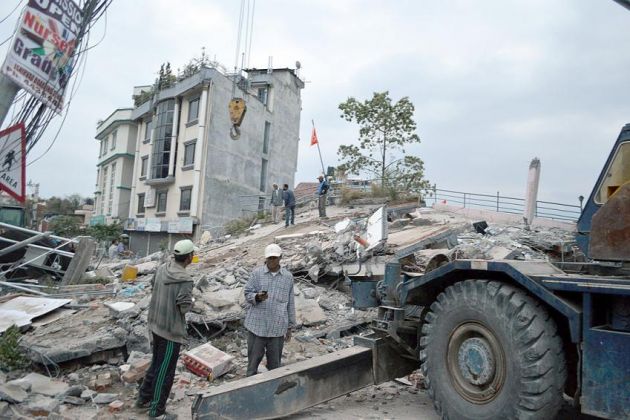World churches say more urgent action needed in quake-hit Nepal

Global churches are calling on the support of worldwide churches and specialized agencies to pull out the stops in providing assistance for the lethal earthquake that has shattered Nepal, one of the world's poorest nations, claiming at least 3,950 lives.
The World Council of Churches, the Christian Conference of Asia and the Lutheran World Federation said their churches and aid groups had launched an immediate large-scale emergency response.
The huge 7.9 magnitude temblor is the quake-prone Himalayan nation's worst disaster in more than 80 years and it triggered the biggest-known avalanche on the world's highest mountain, Everest.
The WCC and CCA said they appreciate the rapid responses of several governments and aid agencies in rescue and relief operations and humanitarian aid.
"We urge churches and specialized agencies in the ecumenical family to extend every possible support for humanitarian aid assistance in Nepal and other affected areas in the neighbouring countries,"said the WCC and CCA.
Rajiv Biswas, Asia-Pacific chief economist for the Colorado-based consultancy services IHS, said Nepal has extremely limited resources to self finance relief efforts and reconstruction, The Associated Press reported April 27.
"The total long-term cost of reconstruction in Nepal using appropriate building standards for regions vulnerable to severe earthquakes could exceed $5 billion, which is around 20 percent of Nepal's GDP," he said.
AP reported that Nepal's annual per capita GDP is only $1,000, and its average family lives in poverty.
Christian Aid's Ram Kishan, regional emergency manager for South Asia, based in Delhi, said: "Nepal is one of the poorest countries in the region and has one of the least capacities to deal with an emergency of this scale.
STRAIN ON MEDICAL SERVICES
"Medical services and hospitals are facing an immense strain at the moment. In Kathmandu Valley, hospitals are overcrowded, running out of room for storing corpses and also running short of emergency supplies.
"At the moment we know that 6.6m people have been affected. However, the numbers are likely to increase because the earthquake epicentres - mainly Gorkha, Makwanpur and Lamjung - are still not accessible.
"Those affected will have immediate and long-term needs emerging in the coming days. The most pressing need at the moment is for food, water supplies, medication, blankets, hygiene kits and other essentials for people who are displaced."
The LWF said it is currently working together with the Nepalese government, the United Nations system and church partners in the ACT Alliance network to coordinate their response.
It said staff on the ground had prepared to distribute immediate life-saving supplies such as water, food, shelter and medication to those affected.
The epicenter of the earthquake was near the capital Kathmandu but many regions were heavily affected, among them Bhaktapur, Lamjung and Pokhara and heavy aftershocks almost as severe as the quake have hit.
The general secretary (elect) of the Christian Council of Asia, Mathews Georges Chunakra said, "We urge churches and specialised agencies in the ecumenical family to extend every possible support for humanitarian aid assistance in Nepal and other affected areas in the neighbouring countries."
"We are deeply concerned at the scale of this disaster," says LWF general secretary, Rev. Martin Junge.
Tremors were felt in several parts of India, Pakistan, and Bangladesh which border Nepal and a minor quake at the Qijiang district of south west China's Chongqing municipality were alarming.
"There are fears the final toll could be much higher than what is already confirmed by now," said the WCC and CCA.